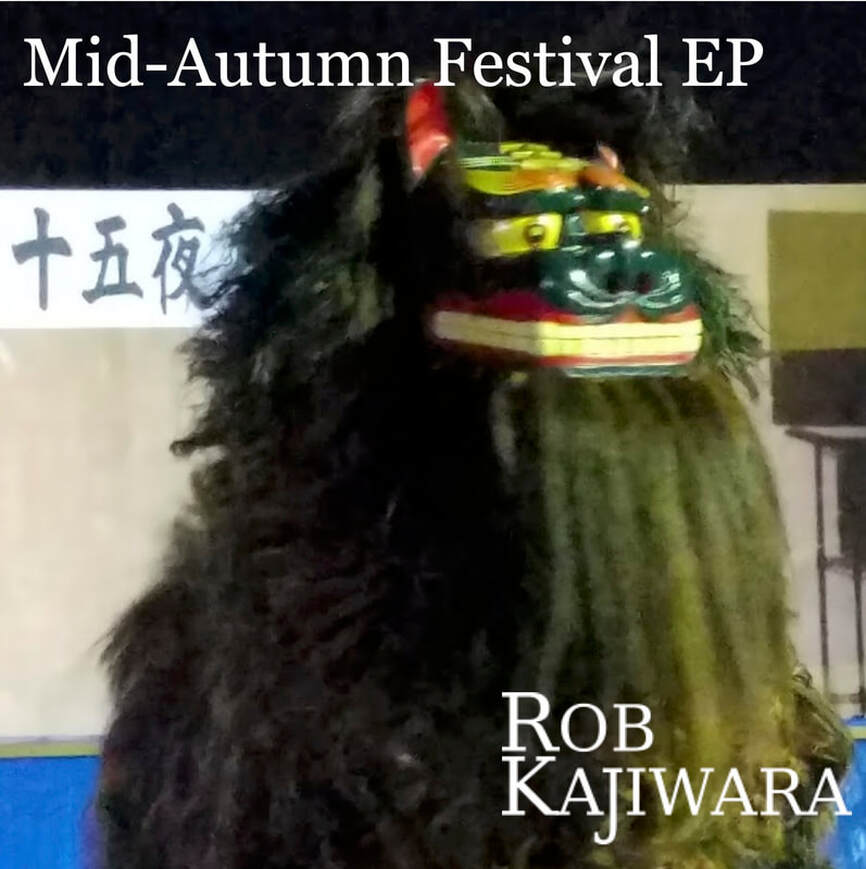Track List:
- Asadoya Yunta
- Aha Bushi
- Ashimiji Bushi
- Kudaka Manjushu
The Mid-Autumn Festival is the most important festival during the fall season for Luchuans / Okinawans. It is also celebrated by China, and many other nations in Asia. It is known as 十五夜 in the Native Luchuan language, and 中秋节 in Chinese. Alternative English names include the Moon Festival or the Harvest Moon Festival.
The Mid-Autumn Festival is a time of giving thanks for a good harvest. During this season, people often partake in moon gazing as a form of relaxation or meditation. Festivals can be found throughout the Luchu Islands where traditional music and dances are performed, including shiisaa (lion dog dancing) as depicted in the album art.
The Mid-Autumn Festival EP by Rob Kajiwara includes four tracks of traditional Luchuan (Okinawan) folk songs.
"Asadoya Yunta" is a traditional song originating from Teedun (Taketomi Island), in the southern part of Luchu. Kajiwara's version is sung in the original Yeema (Yaeyama) language, accompanied by a two-piece instrumental of piano and kucho (Chinese: erhu), a traditional Luchu (Okinawan) bowed string instrument. The song is about the real-life historical figure of Asado Kuyama, a young woman who lived during the 18th century. She defied a Japanese samurai government official who had come to the island to extract tribute from the local people. The samurai demanded that Kuyama marry him, though she refused, risking her life in doing so. To this day Asado Kuyama is a hero to Luchuans, and "Asadoya Yunta" (translation: "Asado's Song") remains a popular song.
The next song is "Aha Bushi," a traditional song originating from Kunigami, the northern part of Uchinaa (Okinawa) Island, and sung in the Indigenous Kunigami language. Kajiwara's version is a solo vocal - sanshin (traditional Okinawan three-string plucked instrument) performance. The song's lyrics talk about love (or friendship).
The third track is "Ashimiji Bushi," a traditional song from the central part of Uchinaa, sung in the Indigenous Okinawan language of Uchinaguchi. Kajiwara's version is a solo piano - vocal rendition. The song is about the value of hard work, and about working for those you love.
The final track of the EP is "Kudaka Manjushu," a traditional song from Kudaka Island, located just east of Uchinaa Island, also sung in Uchinaguchi. "Kudaka Manjushu" is an ancient spiritual song of thanksgiving, often performed alongside rituals conducted by yuta (female spiritual leaders). Kajiwara's version of the song includes multiple sanshin parts, many layers of deeku (J: taiko) drums, and a lead vocal.
The Mid-Autumn Festival is a time of giving thanks for a good harvest. During this season, people often partake in moon gazing as a form of relaxation or meditation. Festivals can be found throughout the Luchu Islands where traditional music and dances are performed, including shiisaa (lion dog dancing) as depicted in the album art.
The Mid-Autumn Festival EP by Rob Kajiwara includes four tracks of traditional Luchuan (Okinawan) folk songs.
"Asadoya Yunta" is a traditional song originating from Teedun (Taketomi Island), in the southern part of Luchu. Kajiwara's version is sung in the original Yeema (Yaeyama) language, accompanied by a two-piece instrumental of piano and kucho (Chinese: erhu), a traditional Luchu (Okinawan) bowed string instrument. The song is about the real-life historical figure of Asado Kuyama, a young woman who lived during the 18th century. She defied a Japanese samurai government official who had come to the island to extract tribute from the local people. The samurai demanded that Kuyama marry him, though she refused, risking her life in doing so. To this day Asado Kuyama is a hero to Luchuans, and "Asadoya Yunta" (translation: "Asado's Song") remains a popular song.
The next song is "Aha Bushi," a traditional song originating from Kunigami, the northern part of Uchinaa (Okinawa) Island, and sung in the Indigenous Kunigami language. Kajiwara's version is a solo vocal - sanshin (traditional Okinawan three-string plucked instrument) performance. The song's lyrics talk about love (or friendship).
The third track is "Ashimiji Bushi," a traditional song from the central part of Uchinaa, sung in the Indigenous Okinawan language of Uchinaguchi. Kajiwara's version is a solo piano - vocal rendition. The song is about the value of hard work, and about working for those you love.
The final track of the EP is "Kudaka Manjushu," a traditional song from Kudaka Island, located just east of Uchinaa Island, also sung in Uchinaguchi. "Kudaka Manjushu" is an ancient spiritual song of thanksgiving, often performed alongside rituals conducted by yuta (female spiritual leaders). Kajiwara's version of the song includes multiple sanshin parts, many layers of deeku (J: taiko) drums, and a lead vocal.

